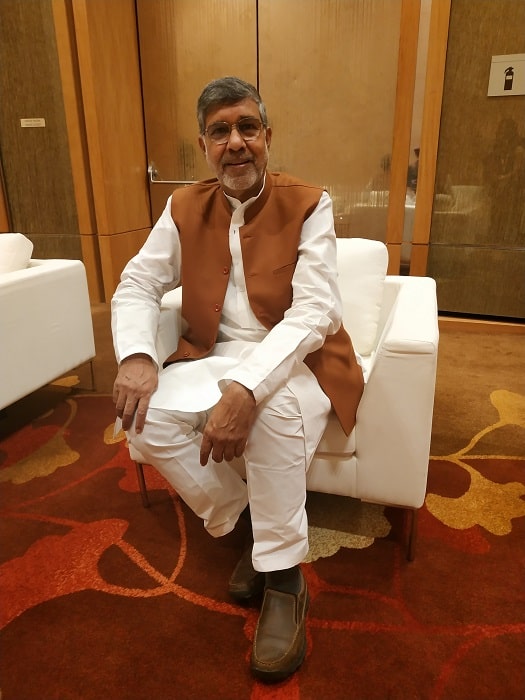Nobel laureate Kailash Satyarthi urges ‘globalisation of compassion’

Kailash Satyarthi
He wants to counter “shrinking hearts” with a “globalisation of compassion”, says the Indian Nobel laureate who gave his award to the nation.
The 2014 Nobel Peace Prize winner Kailash Satyarthi recalled how difficult it was to bequeath the award. There was none in India at the time: Tagore’s 1913 Nobel Prize for Literature had been stolen in 2004; Mother Teresa’s 1979 Nobel Peace Prize had been taken away by relatives. The then Indian President Pranab Mukherjee had to create a new protocol so Satyarthi could give the award to the nation a couple of weeks after receiving it. It’s kept in Rashtrapati Bhawan.
The Nobel laureate was speaking to India Se Media after delivering the inaugural address at IIMPact, an event organized by Indian Institute of Management (IIM) alumni, at the Marina Bay Sands Convention Centre in Singapore on Saturday (August 17).
‘Hearts shrinking in blind race to earn money’
Satyarthi, who shared the award in 2014 with Malala Yousafzai of Pakistan for protecting children against exploitation, told India Se: “In this age of globalisation, we have achieved a lot but also lost something. Hearts are shrinking in a blind race to earn easy and fast money.” But this can be reversed. “It is possible through love, love for children, and through compassion,” said the children’s rights activist whose Bachpan Hatao Andolan (Save the Childhood Movement) has rescued more than 88,000 children from bondage, trafficking and exploitative labour in the last four decades.
Compassion does not mean sympathy only, he said in his inaugural address; it is also means doing something. He played a pivotal role in mobilising support and ensuring the passage of the Child Labour Act in India in 1986. In 1998 he led the Global March against Child Labour, traversing 103 countries, covering 80,000 km. This led to the adoption of ILO Convention No 182 on the worst forms of child labour which was formally acclaimed in 1999 and ratified by 186 countries.
Nevertheless, the Peace Price came out of the blue. An NDTV journalist was the first to call. “Kailash ji, the Nobel,” the journalist said and broke down crying. Fearing something terrible had happened, Satyarthi checked Google and found he had won the prize.
Long struggle
It was the culmination of a long struggle. An engineer, he faced opposition from his family when he decided to give up his job and dedicate his life to helping children in 1980. He was married and had a one-year-child. His brothers said they would help him and he could start an orphanage or a school for poor children but he should not quit his job. But he insisted schools and orphanages were not enough — there had to be structural changes.
“I have been attacked, my office was burnt, my house was looted,” he said, but he has carried on, undaunted.
He did not become an activist overnight. He had been moved by the plight of others since his childhood. He was only five years old when he was moved to ask why, while he could go to school, another little boy, the son of a cobbler, had to work as a shoeshine.
The cobbler told him that was destiny. But he never accepted that. “When I got older, I saved my old schoolbooks and collected my pocket money to pay the fees for poor children” so they could go to school, he told the Unesco Courier.
He was awarded the Nobel Peace Prize for “for the struggle against the suppression of children and young people and for the right of all children to education”.
There are still 152 million child labourers in the world, 428 million children living in poverty, he said. Stressing the need for showing love and compassion for children, he told India Se: “If we start doing so, our personality will change. We will be more connected, more safe. So I am calling for the globalisation of compassion.”
What can one person do?
“You may ask what can one person do?” he said, recalling the words he had spoken when he accepted the Nobel Peace Prize in Oslo on December 10, 2014. “I would recall a story of my childhood: A heavy fire had broken out in the forest. All the animals were running away, including the lion, the king of the forest.
“Suddenly, he saw a tiny bird rushing towards the fire. He asked the bird, ‘What are you doing?’ To the lion’s surprise, the bird replied ‘I am going to extinguish the fire.’ The lion laughed and said, ‘How can you do it keeping just one drop of water, in your beak?’ The bird was adamant, and she said, ‘I am doing my bit.’”
Asked about his next step, Satyarthi told India Se: “I am fighting for a new international legislation – a UN convention to stop digital abuse of children including pornography, child trafficking and so on. That is a tough challenge but this digital abuse of children is ruining the souls of an entire generation.”











